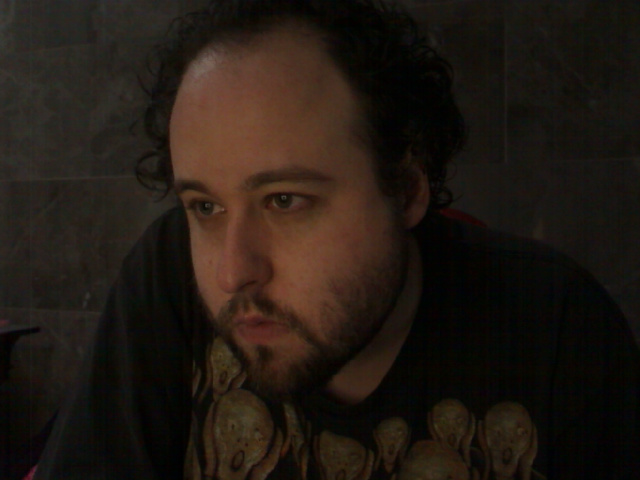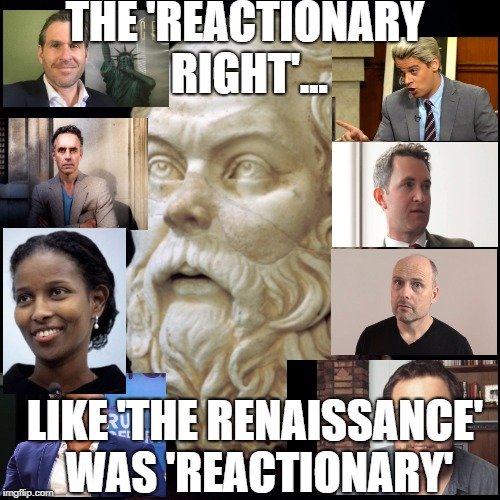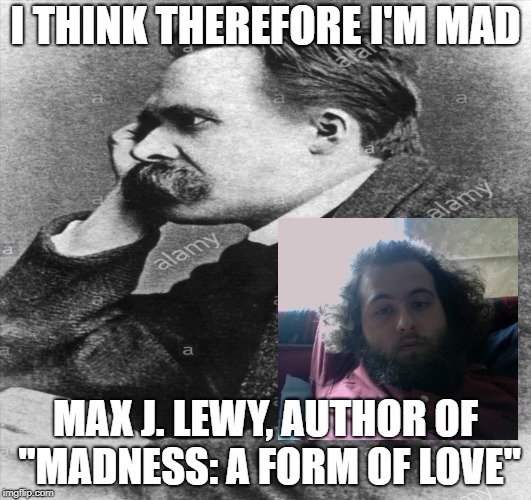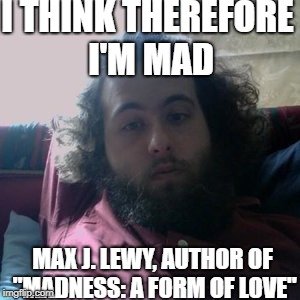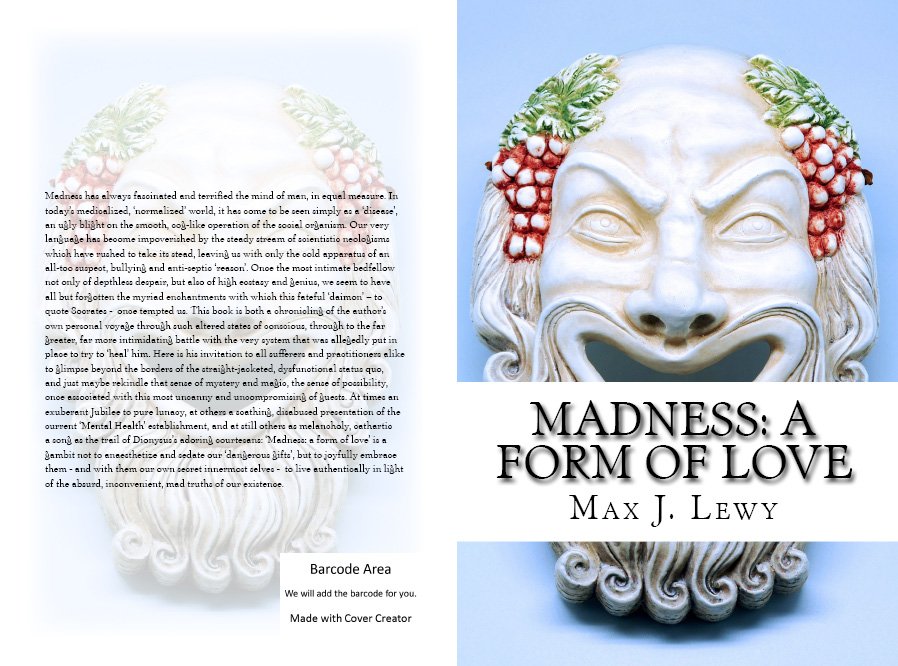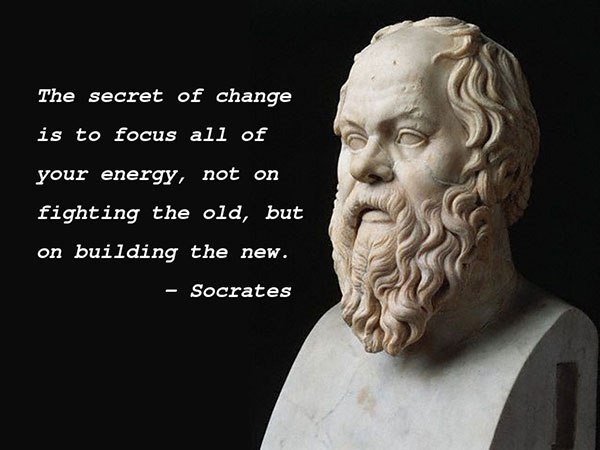-
Posts
72 -
Joined
Recent Profile Visitors
785 profile views
PillPuppetPoet's Achievements
Newbie (1/14)
0
Reputation
-
On self-identity and freedom of conscience. Nowadays, if a ‘woman’ came into a psychiatrist’s office and professed to be a Champion Bull, raring to butt horns in the otherwise peaceful long-grassed meadows once more ... the good Dr. would rightly feel obliged to continue the interview in aggressive snorts and threatening raking at the carpet. But if this erstwhile proud Minator were to opine that there is no such thing as ‘schizophrenia’ or ‘mental illness’, someone’s professional opinion would be gravely offended and someone else’s dosage would be judiciously and roundly quadrupled. The chief problem. The chief problem the madman faces is how to deal with the paralyzing guilt he feels for his overweening and unjust superiority to others in his vicinity, a long with alienation from his own true nature. He solves it either by becoming 'beyond good or evil' or getting himself iatorgenically brain damaged to the point where he is no longer superior, in the process destroying his true original nature. This is exactly the situation our whole civilization currently faces compared to other, more primitive peoples, and from the unprecedented rise in use of prescription drugs it is equally clear which of the two ‘solutions’ we are opting for. One extreme leads to the next. The current rush of ideological fanaticism is the inevitable and logical result of the nihilistic void left by relativism and a silly inculcation of tolerance as the fundamental value, rather than merely as a qualified means of realizing true value. When kids are deprived of beliefs and ideals with which to give their life meaning and grandeur, they will latch onto the first and most vile thing they hear someone speak remotely passionately about. (....a few appetizers from the forthcoming 'Madness, a form of love: The certifiably TRUE ravings of a sectioned philosopher", available 2019) Thanks for reading.
-

The Reality Of Universal Love: Darwin and Christ reconciled
PillPuppetPoet replied to PillPuppetPoet's topic in Philosophy
I think I did make an argument or two. The fact that human beings are fundamentally similar, and can all feel pleasure and pain which is the root of their moral significance. Or how if you love people for who they are - for their 'virtue', as Stefan Molyneux argues - your own arbitrary relation to them is of little or no importance. I also argued that even apparent tribalism is a Darwinian mechanism by which the species has been advanced, so even that constitutes a form of species-love. Finally, I indicated that failure to live peacefully and compassionately with all humanity now constitutes a grave threat to our continued survival as a species due to the progress of destructive technologies. Thank you for your reply. -
'Tommy Robinson': a Russian agent sent to sabotage Europe and lead her to ruin by preventing her from taking in essential refugees to care for our elderly, flip our hamburgers, revitalize our flagging continent with wondrous diversity, re-imagine our N.H.S. and educational system to meet the needs of a buzzing new 12th Century Britain , romance our daughters, solve our demographic problem, thrill us with their exotic cuisine and interesting cultures, re-invigorate our manly martial spirit, keep our police force on their toes and culturally sensitive, save innocent people's feelings from being hurt by naughty words and thoughts, provide solutions to our female and LGBTQ rights issues, de-construct our capitalist economy, enhance our language skills, open up new ties to the global economy and cement friendships with other nations, siphon off the best and brightest minds, provide work for our prison staff and criminal justice system. re-build local social cohesion by creating tight-knit communities or 'no-go zones' where people feel so at home they feel no need to interact with the rest of society, promote more modest and elegant attire in public, stimulate our secret services into action and improve surveillance and bomb disposal techniques, be prepared for anything, tighten security in our ancient museums and public spaces, provide free 'mentoring' services for our kids, have occasions to display our open-mindedness, tolerance, and generosity to ourselves, make amends for our historical sins and their legitimate grievances, test our faculties of self-denial, provide guaranteed new voters for the Left, reduce pollution caused by excess unnecessary industrial production, overcome the residues of potentially deadly chauvinistic nationalism and collective identity, roll back the Enlightenment and its manifest failure represented in its inability to prevent the World Wars of the 20th Century a long with the oppressive unprecedented stagnation of the last 70 years in the painful yet more vigorous and intimate frisson of civil conflicts, fight moral relativism, issue forth the new post-modern age, stave off the Nietzschean 'last man' at its absolutely nauseating prospect of universal peace, prosperity, and happiness, add a tantalizing and salutary hint of madness, fix our usurious debt-laden banking system, commit our support to the poor Palestinians and restore order in the Middle East, curb our foreign adventurism in that region, give a fresh perspective on 'the Jewish Problem' at once both young and old, and, most importantly, restore religious awe and fearful respect and unquestioning loyalty and obedience to its rightful place at the very center of society. If this terrible man gets any traction, we may well be deprived of all these wondrous, strange, and magical new experiences and forced to go back to to a time when everyone ate chicken dinner for Sunday Lunch, their only real enjoyment in life was secretly donning a Nazi Uniform to engage in otherwise boring and stale intra-racial sex, and even the word 'diversity' was forbidden. Most of you are too young to remember, but it was like that just a few years ago and had been ever since the beginning of time. It is only modern progress and trendy multiculturalism that give life any meaning whatsoever. Seize the moment. Become the moment. Embrace change at all costs. Open yourself up totally to the Other. Accept him. Love him. Lose yourself. Never resist. Never go back. Your destiny calls. Become The Rainbow.
-
My philosophical interest in the TRUTH, not in what I perceive to be other people's mistakes and logical muddles about it. Logical muddles are not interesting to me, I don't remember them. My limited memory is more dedicated to the nature of the soul, the nature of society, the nature of the Cosmos, search for the good life, weighing up different values and outlooks, actual logical relations, and intellectual and world-history dynamics, etc. I wrote the critique because Stefan Molyneux was one of the very few things that inspired me and kept me going through very low periods. Not only do I like listening to what he has to say, but being something of a cult figure he offers a ready made platform here to engage with real philosophy among people who share a similar outlook to myself. So, I wasn't engaging in UPB because I liked UPB, but because UPB was considered by a philosopher who I find very engaging and relevant to be relevant to his overall system. It may not seem like much of a service - seen as I basically came at it from the point of view of demolishing the theory (rightly or not) - but it was basically just meant as my own contribution to this thriving community and my own personal homage to Stefan's work. The very reason I felt I had something to contribute was because I so strongly DISAGREED with it, and I thought I could see a lot of its holes; on the other hand, I haven't bothered commenting on the parts of his work that have influenced me most because, in that case, I am the student sitting at the Master's feet trying to absorb his every word - rather than feeling that I have some kind of better view of things which I can offer to others. So, really NO, my interest in UPB was, just being brutally honest, not philosophical and truth-orientated, it was merely an intellectual exercise and a kind of challenge I set myself. Sorry to make this unflattering analogy, but I might as well have been deconstructing a film I thought was poor, going into minute detail about why I didn't like it. The film itself didn't teach me anything profound; more like I was hoping to teach others a few things through it. I'm sure that sounds rather arrogant and ridiculous to those who don't see anything wrong with the theory, but I am confident in my own perceptions and I reserve the right to my own opinion. There is no use deferring to others out of far greater market share when the truth seems a certain way to you. Of course that wasn't intended as my argument; of course that's what I would claim. There is no use going into it again either, if you can't see what my objections are in that critique above then nothing I can say here could possible make you, either. I would humbly suggest though (because I myself think my objections are good) that if you can't see my objections, you're not approaching it logically, but are perhaps too emotionally committed to putting stock in what the Great One has to say despite all evidence to the contrary. Sorry for being so rude, but as I've made clear already, from where I'm sitting this theory in an Emperor With No Clothes and Stefan's undoubted charisma is the most likely thing I can think of to be holding it together. Its natural that one would automatically place a lot of worth in his productions, because so much of what he says is amazingly enlightening, extremely relevant to our lives today and rationally persuasive. As I say though, one has to have the courage to call bullshit where that's what one's eyes are telling one. It would be a disservice to Stefan Molyneux to do anything else, who has so dedicated himself to tireless rational confrontations in pursuit of truth, unmasking and urging us to be wary of so-called 'authority' figures, and embracing criticism. Maybe I have missed something important though. As I said, my recollection of even my own essay isn't good. But, if you do come up with any questions, I'll try to answer them by reading back through it a bit. Let me know.
-
Wow. Where do I start with this ? Real character assassination at someone who has simply been frank enough to admit he isn't anywhere near as verbally competent as he'd like to be. Obviously your 'depth psychology' sessions have set up a 'paradigm' where you feel it necessary to be extremely and unjustly harsh on your interlocutors for any admission of weakness. (That is one of the flaws of modern psychology with its excessive interest in 'debunking' and emphasis on exposing 'hidden motives'. ) Sure, I could just read sections of it out, but its rather long and I can't read all of it out can I ? Either way, it would come across very awkwardly. Still, I may very well do that at some point if its agreeable to all parties. For someone who thinks so little of my writing as you apparently do, I can't understand why you think I have such an urgent 'responsibility' to get myself on the show. Maybe I shouldn't say this, and I say it with the proviso that I do really admire Stefan's work in many other respects, but I feel it would also be rather disingenuous to go out of my way to appear on the show as I honestly do not think enough of UPB to even have a serious philosophical interest in it. Hence why I've already forgotten most of it (indeed it didn't make any definite memory pathways even while I was writing it, because I feel the whole theory is baseless, illogical and amounts to spinning sophistical words together in thin air! I generally remember only TRUE things, not false, nonsense things I disagree with and all my countless objections to them). The only thing you say that is true is that I don't exactly relish the idea of the debate, or it makes me feel 'uncomfortable'. Not because I would find it unbearably 'shattering' or a 'relief from responsibility' (what 'responsibility' exactly?), but because like everyone who is rational I want to appear at my best... or at least in a way that adequately represents my ideas. There is nothing defensive or psychologically deficient or illogical about sticking to what you're good at, you know. Although I can say it has genuinely inspired and encouraged me a great deal to find that there are people like Mr. Molyneux out there, my life doesn't revolve around FreedomainRadio either. I am not exactly a joiner. The world is too big for that, and I'm not stubborn enough to stick to one small part of it. (All power to people who are though.) Even if I did get the chance to appear, it would be mostly as an attempt to provide a service to Stefan and his viewers, try to attract an audience for my own writings, and just for the sheer enjoyment of the great privilege to chat to good man like Stefan Molyneux. But given that I'm not confident it would achieve those goals, and due to my own reclusive, introverted nature I find unusual 'social occasions' more stressful than exactly enjoyable (and the fact that I may have just caused some minor offense now by my lack of interest in his favorite theory): why do it ? I would also suggest your view that my failure to perform that role invalidates what else I have to bring to table is a reflection of your own prejudice in favor of vain public sparring and falling under the influence of a cult of personality, as opposed to the appreciation of ideas for their own sake. Such things are not without legitimate attraction, but the written word is not without its own value. Again, why do you seem to be so offended that I don't jump at the chance to come on the show, when you don't even seem to value the more substantial contribution I've already made? I'd say that is more like a projection of your own insecurities about your devotion to the theory in question and/or the thinker behind it. Why do you think I have some 'responsibility' - that I owe it to you or someone - to go on the show? Is this some kind of Royal Court where 'he who is invited before the King must not dare refuse'? There's no disrespect to Stefan Molyneux here. Its precisely because I put such stock in his opinion that I feel somewhat unworthy or uneasy about gracing the presence of him and his listeners. As you say, the reason I haven't booked an appointment as of yet is partly own issues. I really didn't think it was such a big deal or reason to try to humiliate someone by questioning their self-awareness though. According to my own philosophy, people must do what they feel comfortable with, not try to force themselves into things which they don't. In my opinion, the problem is not that the former serves my 'ego', but that the latter is a form of cowardice - an inability to stay true to and assert one's own emotional needs due to fear of appearing ridiculous, weird, or stand-off-ish. While I don't mind criticism per se, nor do I feel the further intimidation tactics you've used here are either justified or the right way to make someone feel like doing anything. What next? Are you gonna call me a 'pussy'? I dare say this might be some 'toxic masculinity' you have going there. I'm sorry, but I don't respond to that kind of motivation. I think you should learn to appreciate and respect people's concerns rather than trying to undermine their own value systems by purported references to psychological instability. I think you will find it is much more effective. If I want to go on the show, and they are happy to have me on, I will. Its not for you to tell me when. If FreedomainRadio want to issue me some kind of 'ultimatum', that is entirely up to them (but I highly doubt they will.) I really didn't think it was such an issue, and in fact, although I strongly refute the charge that it would be 'better for ME' to appear on the show, and that NOT doing so represents some kind of 'psychological abnormality', the fact that there is such intense feeling over my post will only act as a greater impetus for me to finally get around to it and make the effort to swat up a bit as necessary. If I've offended anyone involved with the show, I sincerely regret it. I think Stefan Molyneux seems like an extremely fair-minded guy though, who wouldn't take offence too easily even if he did find someone's behavior rather evasive, (as long as they weren't doing it to get the better of him in an argument, anyway - which I am actually not, btw). I think Stefan Molyneux is easily man enough to tolerate someone posting a critique of his work without them being FORCED to come on his show. If I am wrong, well... so much for 'free' domain. :-/ Bear in mind, I have bought all his books available on Amazon and donated to him personally (and I have receipts to prove it), and I urge everyone else who is able to do so. IMHO, his ethics needs re-working though. But its just my opinion. And you think nothing of it, anyway - right? Come on, if you're not prepared to read my essay, which I've already gone to a lot of trouble to write and conveys all my ideas much better than even I can myself, why should I be bothered to put myself through what I've already said would be a bit of a stressful and unnatural experience for me? By the way, I felt no real need to defend myself like I just have above, but I had some spare time on my hands so I found it entertaining to do so. Hopefully you'll find my response somewhat worthwhile - if you've bothered to actually read it this far. As regards your response to my critique: 'whether someone would act immorally is irrelevant to whether something is true or not'. But Stefan isn't arguing that: he's not arguing whether something it 'true or not', he's arguing for UPB. And on that account, the argument is a failure. As regards the 'IF/THEN' interpretation, I really don't even remember how that fits in with Stefan's theory (see why I am not too keen to get into a verbal debate). But, as I've outlined above, that interpretation won't save his hole-ridden arguments for the various absolutes he tries to prove. Have a nice day.
-

The Reality Of Universal Love: Darwin and Christ reconciled
PillPuppetPoet replied to PillPuppetPoet's topic in Philosophy
Another thing I am getting at in my writing about 'madness', is to make light the supposed definition, and concentrate of the fact of how the word is actually applied to people who get the official label. In my view, the concept of madness as a mental disease is largely fictitious and fabricated by people's fears and imagination. In my view, the unwanted, covert or by-product meaning of 'people who go against societies norms' or 'think too much' is the only real meaning there is to it. And if you see it like that, madness is actually a GOOD thing that merely gets unfairly slandered. That's why I'm proud to call myself 'mad', in solidarity with all the other 'madmen', who are really just contrarians with terrible luck. The dictionary definition of madness doesn't match up with the way it is applied. There might be a few very rare cases of something resembling the dictionary definition, but basically its just a product of the madness of mainstream society and their fantastical imagination, a product of literary fare. And I should say that definition is itself littered with absurdities. As I say, in reality, its not just people in madhouses who meet it; the entire public does. So its a terrible definition, totally out of kilter with the way it is used and a word obscured by non-sense and irrationality itself. If you have a whole country who is saying eggs are beans, well, the meanings of the words themselves kinda shift for all intents and purposes. Only philosophers can define who is really mad or not; but they're not in control. So I guess in a way I am saying it playfully; well, irreverently anyway. It shows how much weigh I put in the notion, how little respect I have for society's opinion about who is mad and who isn't. Its wry. Its heavily ironic. -

The Reality Of Universal Love: Darwin and Christ reconciled
PillPuppetPoet replied to PillPuppetPoet's topic in Philosophy
Ha ha, no that's not what I had in mind. Thanks for sharing how it strikes you though. It is actually meant primarily as in 'Anyone who questions, anyone who thinks, is liable to be viewed as crazy by this insane society." (at least if he doesn't take precautions.) Of if not anyone, at least in my case, the reason I'm called crazy is highly related to the fact that I think differently - which in some ways is pretty much the same as saying I think at all. Real thinking has an inherent tendency to be 'different', especially in a crazy society like ours. In some of my writings, there is also the celebration of a kind of madness or irrationality. Martin Heidegger himself associated thinking with eschewing the claims of Reason: "Thinking begins only when we have come to know that reason, glorified for centuries, is the stiff-necked adversary of thought." Martin Heidegger It could mean something like "My thinking leads me to embrace madness, the irrational side of human nature." Not necessarily in a light-hearted way. 19th and 20th Century philosophy arrived at the conclusion that Reason offered no guidance to action. So, once again, you can see how madness is basic to our nature according to 'thinking'. -

The Reality Of Universal Love: Darwin and Christ reconciled
PillPuppetPoet replied to PillPuppetPoet's topic in Philosophy
I don't follow you. Explain? -

The Reality Of Universal Love: Darwin and Christ reconciled
PillPuppetPoet replied to PillPuppetPoet's topic in Philosophy
I'll tell you if you give me your own opinion first. -
"Since human beings are fundamentally the same in so many ways - while their manifestations vary, their potential is undoubtedly alike and they all share the same basic faculty for consciousness, pain and pleasure which gives them their moral significance - trying to restrict your love to just a selection of human beings rather than all of humanity is utterly illogical, and only demonstrates one's detachment from reality and his or her own inability for true objective evaluation itself. That being said, when people love only their family, tribe, nation, etc., in reality they are usually loving the whole of mankind through them. What I mean by this is that their seemingly parochial love is actually a Darwinian mechanism which connects them to the species as a whole; when they love their tribe over others, what they are really doing is loving the process of natural competitive selection which has been proven to advance the species as a whole. Realizing that their own tribe has just as much claim to supremacy as any other, showing open-hearted philanthropy to outsiders would do more harm than good; it would merely fly in the face of the Darwinian mechanism for species advancement and give sustenance to those who had not proven their worth on the battlefield. Even for a more modern man, who recognizes the intrinsic worth of every individual, certain 'choices' may be necessary in order to attain the best result for the species as a whole, only because he has transcended the realm of petty tribalism and attained to a true objective valuation, they will not be based upon narrow tribal loyalties, but objective characteristics, that cannot be because he does not love and pity those who draw the short straw. The next big question is whether the parochial love is really of such a lesser status, a sign of a more primitive psychological development and abnormality that I am making it out to be here, or is it only the tension between these two types of love- the fact that they war within us and one has to lose out and thereby be denigrated - and the process of History - the fact that parochial love seems to be the one very much on the retreat and swamped on all sides - that makes it appear that way to us? Could the loyalty to objectivity be the real disorder? Perhaps objectivity in this usage in an aberration of its true function to serve rather than undermine tribal loyalty.... No. Whereas in the past, tribalism served the species via Darwinian selection, now, with more advanced technological weaponry, it is a threat to the survival of life on earth. The power of assessing order of rank, which grows side by side with objectivity - in fact, properly speaking it is indistinguishable from it - is the greatest power on earth to advance the species, which is THE innermost desire of every human being on earth. It was a bit too saccharine when we praised true object love for its own sake; its superiority in dignity is not so much intrinsic to itself - the patriot does not necessarily fail to recognize the 'Being' of his adversaries; he merely in addition recognizes their lack of the quality of political allegiance with himself and places importance on it for the sake of his own survival- the superiority of objective valuation somewhat remains chiefly only in the modern age, not so much in its clearness of vision in terms of objectively human, or even stronger traits... but in of objectively less violent, belligerent or chauvinistic ones, a long with the recognition that it is a deliberate weeding out of such anti-social traits that is most essential to the survival of life on earth. This means it has the far greater quantum of power at its disposal for the benefit of mankind. For us to survive as a species, contra Nietzsche, we have to privilege pacifism and Law above intelligences that initiate the use of violence, to seek out and humiliate the desire or perhaps even the capacity for war- that which was previously thought, and many of us still feel in our blood, is the noblest of human instincts." - Max J. Lewy https://madnessaformoflove.blogspot.com/
-
"One of the main aims of philosophy - if not THE aim -, as I understand it, is to correctly and adequately grasp one's own identity, inter-relationship and ultimately one's best policy/ 'God-given mission' in relation towards the concentrically outward stacked domains of self, family, friends and locale, country, planet, and Universe, with an emphasize on and understanding that it is the first and the penultimate categories of this series which are most definitive and most important. It is only by doing this that one comes into one's full humanity, since it is only by this way one realizes one's destiny as a valuable, meaningful and conscious agent of that great brotherhood. Though this, as I say, is the aim, very, very few fully attain it. Fortunately, there is a shorter and easier interim method. Though very few of us can consciously grasp the Whole in all its infinite complexity, we each have an instinctive emotional attitude towards it, together with all the other aspects of our existence. This emotional attitude, when properly harnessed and developed, is like a God-given light in otherwise total enveloping darkness. This God-given light is a natural compromise between the needs of the body and of the soul: of the need for mortal safety and action, on the one hand, and the knowledge of the Whole, that is necessary for really intelligent and purposeful action, on the other. However, as I say, this is only an interim method by which God permits us to keep our spirit alive in relative darkness. While a sense of purpose, i.e. true knowledge of how one can positively inter-relate within one or two of the concentric circles is a lot better than no purpose at all, for such knowledge to bring the greatest happiness it includes all of them. Otherwise, we will always have gnawing sense, often blossoming into unconscious yet total despair and the spiteful attitude that brings about, that we are working against History and our own true values. That is why small-minded people are usually the most spiteful. The reason most people are so unhappy is because society does not teach them to follow that little blue flame in search of their destiny and conscious informed action for the sake of humanity, but expects them to merely 'fit in' to their little circle and run on habit and base impulses, like mere dumb animals. It goes extremely against current thinking to say this, but the truth is all human beings are deeply moral beings. Because we all share 99% of the same D.N.A., the 'selfish gene' dictates we all have an instinctive desire to benefit one another and act as custodians of the species as a whole. The reason people are so unhappy and 'selfish', so harmful to one another is only because they haven't been taught how to truly act otherwise - because we don't KNOW how to benefit the species as a whole; we aren't even shown the ropes on the way to this basic, deep-seated need we all have. Let us all say once again with Socrates (and really mean it this time) : "All evil, truly, comes from ignorance. " The main reason this seems so counter-intuitive is because nowadays we think of knowledge in terms of abstract propositions and specialist subjects that have very little to do with global politics or the state our own souls; but, in reality, all wisdom is of a practical nature, concerned not with narrow specialties, but with the Whole. The fact that it is really ignorance that drives people to do harmful things is also testified by the striking facts, firstly that they generally are none-too-bright when properly examined, and secondly, of their general striking unhappiness and pessimistic attitude towards life (it should also be noted that because everyone is so harmful anyway, since we are only harming the harmful it doesn't make much difference to the overall well-being of the species. It is only when human beings attain a rational perception of the Good, or some genuine kindness and at least the more intermediate awareness of it I mentioned above... or when we recognize their potential to do so, that they become really lovable to us.) . Philosophers, -or at least the best ones- on the other hand, (corroborating this theory) though they often make mistakes like everyone else, as a rule tend to be actually - in fumbling sort of way - usually quite saint-like (even Nietzsche, although he wouldn't have liked that designation... but that only shows how fastidious he was in being above honorific epithets that most people would sell their soul for, and do) , or at least considerably more morally fastidious and more gentle than average, including much more so that many other high-status members of society, such as priests and psychiatrists, both of whom are notorious not only for their amazing ignorance, but also for their sexual abuse and self-serving control tactics. It is important to note that philosophy, as I'm speaking of it, is not just about the latter, outer rims of the concentric circles I mentioned at the beginning, but also about knowledge of the Self, which I mentioned as one of the two most important stacked layers (in fact this is THE most important layer of all). In so far as a person has self-knowledge, some genuine knowledge of the soul and its needs, they are therefore akin to philosophers. That is why people who are quite ignorant of global politics can still be much happier and kinder than most other people, if they have some true insight about themselves and therefore also the needs of other individuals. The world does need a "Caesar with the soul of Christ" - someone who combines knowledge of grand politics and the human soul-; but, failing that, a Christ (or many Christs - real Christians - , as many as possible) will do nicely. Philosophers, in general, when they aren't making headway into the nature of the Whole itself, are traditionally concerned only with doing the one thing they know to bring real happiness and good-will - spreading philosophy (inquiry into the nature of the Whole, but particularly the Self, as above) to as many people who are capable of it and who will listen. Because that is the only thing that can save us." - Max J. Lewy
-
*Below you see before you the lineaments of a NEW ROADMAP TO (objective) MORALITY. An improved alternative theory to UPB* One of the main aims of philosophy - if not THE aim -, as I understand it, is to correctly and adequately grasp one's own identity, inter-relationship and ultimately one's best policy/ 'God-given mission' in relation towards the concentrically outward stacked domains of self, family, friends and locale, country, planet, and Universe, with an emphasize on and understanding that it is the first and the penultimate categories of this series which are most definitive and most important. It is only by doing this that one comes into one's full humanity, since it is only by this way one realizes one's destiny as a valuable, meaningful and conscious agent of that great brotherhood. Though this, as I say, is the aim, very, very few fully attain it. Fortunately, there is a shorter and easier interim method. Though very few of us can consciously grasp the Whole in all its infinite complexity, we each have an instinctive emotional attitude towards it, together with all the other aspects of our existence. This emotional attitude, when properly harnessed and developed, is like a God-given light in otherwise total enveloping darkness. This God-given light is a natural compromise between the needs of the body and of the soul: of the need for mortal safety and action, on the one hand, and the knowledge of the Whole, that is necessary for really intelligent and purposeful action, on the other. However, as I say, this is only an interim method by which God permits us to keep our spirit alive in relative darkness. While a sense of purpose, i.e. true knowledge of how one can positively inter-relate within one or two of the concentric circles is a lot better than no purpose at all, for such knowledge to bring the greatest happiness it includes all of them. Otherwise, we will always have gnawing sense, often blossoming into unconscious yet total despair and the spiteful attitude that brings about, that we are working against History and our own true values. That is why petty-minded people are usually the most spiteful. The reason most people are so unhappy is because society does not teach them to follow that little blue flame in search of their destiny and conscious informed action for the sake of humanity, but expects them to merely 'fit in' with their little circle and run on habit and base impulses, like mere dumb animals. It goes extremely against current thinking to say this, but the truth is all human beings are deeply moral beings. Because we all share 99% of the same D.N.A., the 'selfish gene' dictates we all have an instinctive desire to benefit one another and act as custodians of the species as a whole. The reason people are so unhappy and 'selfish', so harmful to one another is only because they haven't been taught how to truly act otherwise - because we don't KNOW how to benefit the species as a whole; we aren't even shown the ropes on the way to this basic, deep-seated need we all have. Let us all say once again with Socrates (and really mean it this time) : "All evil, truly, comes from ignorance. " The main reason this seems so counter-intuitive is because nowadays we think of knowledge in terms of abstract propositions and specialist subjects that have very little to do with global politics or the state our own souls; but, in reality, all wisdom is of a practical nature, concerned not with narrow specialties, but with the Whole. The fact that it is really ignorance that drives people to do harmful things is also testified by the striking facts, firstly that they generally are none-too-bright when properly examined, and secondly, of their general striking unhappiness and pessimistic attitude towards life (it should also be noted that because everyone is so harmful anyway, since we are only harming the harmful it doesn't make much difference to the overall well-being of the species. It is only when human beings attain a rational perception of the Good, or some genuine kindness and at least the more intermediate awareness of it I mentioned above... or when we recognize their potential to do so, that they become really lovable to us.) . Philosophers, -or at least the best ones- on the other hand, (corroborating this theory) though they often make mistakes like everyone else, as a rule tend to be actually - in fumbling sort of way - usually quite saint-like (even Nietzsche, although he wouldn't have liked that designation... but that only shows how fastidious he was in being above honorific epithets that most people would sell their soul for, and do) , or at least considerably more morally fastidious and more gentle than average, including much more so that many other high-status members of society, such as priests and psychiatrists, both of whom are notorious not only for their amazing ignorance, but also for their sexual abuse and self-serving control tactics. It is important to note that philosophy, as I'm speaking of it, is not just about the latter, outer rims of the concentric circles I mentioned at the beginning, but also about knowledge of the Self, which I mentioned as one of the two most important stacked layers (in fact this is THE most important layer of all). In so far as a person has self-knowledge, some genuine knowledge of the soul and its needs, they are therefore akin to philosophers. That is why people who are quite ignorant of global politics can still be much happier and kinder than most other people, if they have some true insight about themselves and therefore also the needs of other individuals. The world does need a "Caesar with the soul of Christ" - someone who combines knowledge of grand politics and the human soul-; but, failing that, a Christ (or many Christs - real Christians - , as many as possible) will do nicely. Philosophers, in general, when they aren't making headway into the nature of the Whole itself, are traditionally concerned only with doing the one thing they know to bring real happiness and good-will - spreading philosophy (inquiry into the nature of the Whole, but particularly the Self, as above) to as many people who are capable of it and who will listen. Because that is the only thing that can save us. https://madnessaformoflove.blogspot.com/
-
- upb rival
- objective morality
-
(and 1 more)
Tagged with:
-

I have decided to dedicate my life to philosophy
PillPuppetPoet replied to Mole's topic in Self Knowledge
You can teach yourself to feel differently. That is the essence of being a conscious spiritual Being. And yes, you can choose your thoughts. And you're right that is one of the main methods to effecting/affecting yourself positively in general. It is all a matter of constant concerted determination. An Enlightened individual is constantly vigilant about everything they do, both internally and externally. He or she only indulges himself or relaxes his defenses such that it makes for overall spiritual growth. Everything else is recklessness and dissipation. It is precisely a matter of paying close attention one's feeling/emotional state. This feeling is our deepest and most RATIONAL impulse, a succinct summary of all our intelligence put together that, because it is so very rich and densely packed, can only manifest as a general FEELING, rather than individual, isolated thoughts which can cognitively, intellectually only be processed one at a time in much more detail than is compatible within the general but highly attuned summary of emotion. Over weeks and months, if one keeps up this diligent and vigilant attitude of self-carrying, self-discipline, one's sense of consciousness and emotional fulfillment will vastly improve. Instead of feeling guilty for one's constant dissipation and bad decisions, one will experience a sense of euphoria of easy and graceful self-mastery, with a genuine learning from every day occurrences taking place and superior adaptation to and mastery of one's environment. Eventually, a far more positive attitude to life will manifest itself and the limiting factors which you used to curse and bewail will fade into insignificance as you accept your lot in life with equanimity and gratitude. And, ironically, once you achieve that, the sky is very nearly the limit. But, at the same time, you will have recognized the vanity of all outward signs of success and with it the true reality, infinite majesty and self-sustaining quality of the Spirit. The terrors cease to terrorize you and even the pains become less painful and much more in between. The only remaining task is to pass this onto others and take everything else none too seriously, basking in what glories fall one's way but NEVER lamenting, sighing and least of all, gnashing one's teeth over their absence. That is the wondrous journey that awaits you. *** (And that's just the beginning...) https://madnessaformoflove.blogspot.com/ -
No not yet. My fault. Problem is that I wouldn't necessarily be able to convey many of my points orally. I am not good at remembering all my arguments like Stefan. I just concentrate on a problem for a moment, write something, then all but forget it. I am impaired from psych. treatment. Still, I might give it a go eventually.
-

I have decided to dedicate my life to philosophy
PillPuppetPoet replied to Mole's topic in Self Knowledge
That's fantastic, Mole. I like the way you think as well. I wish you the best of happiness. If you ever want someone to bounce ideas off on any topic, just send me a message. I'm very tolerant of all types of perspectives.
